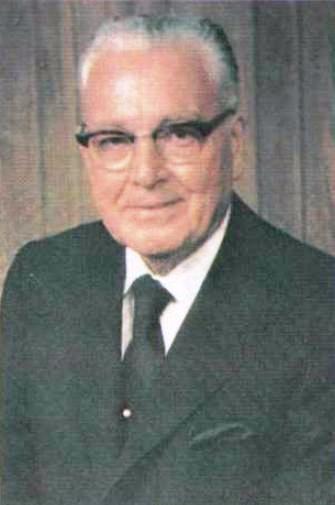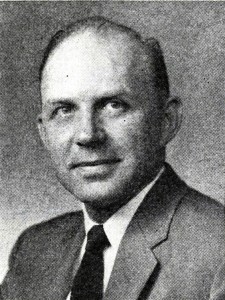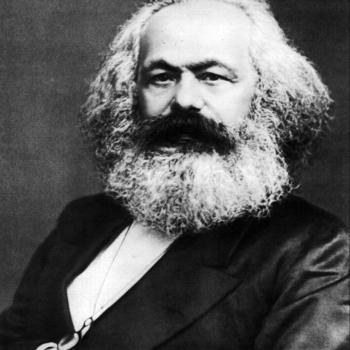[This is another addition to our ongoing General Conference Odyssey — which project you can also check out via our facebook page. To learn a little about the reasons which motivated this project, you can visit this recent article at Meridian Magazine.]
Three talks in this session of conference (October 1971, Saturday Morning) emphasize the need for a Restoration of the fullness of the gospel. The need for such a Restoration is set against the evidence of a civilization that is morally and spiritually exhausted, and the fullness of the gospel is set forth as the complete basis of a fullness of life, both spiritual and temporal.
President Harold B. Lee of the Quorum of the Twelve Apostles (“Watch, That Ye May Be Ready”) sets his remarks in the context of “a great expansion of the work of the Church throughout the world.” One reason this expansion is needed is the “suicide” of religion that has taken the form of an attempt to be ideologically “relevant.”
Never, it seems, has there ever been more unmistakable evidence of a need for spiritual guidance, as we met throughout our visits in these countries those who are seeking for answers to problems that confront them on every side. We have sensed that everywhere there is much dissatisfaction with the churches to which they have belonged. The real reason for this decline seems to stem from the fact, as one columnist has summarized it, “organized religion isn’t being attacked. It’s busily committing suicide trying to keep up with [the] Jane Fonda and Timothy Leary” type of relevance which would “tune out that corny old Bible, split out of that moldy church and turn on with relevance!” (Dr. Max Rafferty, “Church Should Examine Own Action in Decline of Religion,” Salt Lake Tribune, September 19, 1971, p. A-13.)
The True Church’s alternative to this misguided ideological relevance includes “a true definition of what constitutes divine authority,” and a gospel that addresses “temporal and social, as well as spiritual, needs.”
They are clamoring for security or a salvation, not just in the world to come, but for a temporal salvation here and now that they don’t have to die to get. There is a need for their churches to have concern about the personal welfare of the individual, so that each one could be aided to help himself through a unified church effort and a brotherhood in the Church that concerns itself with temporal and social, as well as spiritual, needs.
They are looking for a church where there is not only unity to be found within their local congregations, but which reaches out to a unification of effort in meeting the challenging problems confronting mankind; where a church congregation in one nation links hands with those of a common faith that spans the continents and the oceans and proclaims a universal brotherhood to which they may look with confidence in matters of health and education, strengthening of home ties, and in evolving and promoting constructive church activities where youth are taught correct principles so that they can learn to become effective leaders themselves; where wholesome activities are in such abundance that there is less time to engage in the evils that beckon on every side.
…In short, the demand everywhere is for a church that is holding fast to the basic ideals of Christianity, as the apostle James has defined it: “Pure religion and undefiled before God and the Father is this, To visit the fatherless and widows in their affliction, and to keep himself unspotted from the world.” (James 1: 27.)
In an apparent reference to ongoing efforts of “correlation” by Church leaders, begun about a decade earlier, Pres. Lee offers a frank argument in favor of centralization:
There we have found a strong central authority that inspires a confidence that shows the way ahead—where the strong are marshaled to give liberally of their leadership, of their means, of their talents; where the weak are urged to maximum effort in providing for themselves; where emergency needs can be met in a way that fosters brotherhood, instead of a deadening process that is described, scripturally, as to “grind the faces of the poor.” (Isa. 3:15.)
Never has there been a greater need in the Church for training in leadership and in effective teaching to offset the clever and diabolical methods of evil powers that “pacify, and lull them away into carnal security,” stirring them up to anger, saying that all is well and with flattery telling them there is no hell nor is there a devil, for this is the way, as the ancient prophets have warned, that “the devil cheateth their souls, and leadeth them away carefully down to hell.” (See 2 Ne. 28:20–22.)
The importance of a strong institutional Church to both the “strong” and the “weak” is notable in this statement. In Pres. Lee’s vision, such an institution is essential to calling forth the best efforts of both groups for the good of the whole. I note that dissident members who are distrustful of authority or envious and resentful of “hierarchy” generally fail to note the powerful tendency of the inspired Church organization to channel the efforts of those who are “strong” in means and talents toward the common benefit. Likewise, whereas those who wrap themselves in claims of secular “compassion” generally associate charity with the mere redistribution of material means, Pres. Lee here identifies true welfare assistance with eliciting “maximum effort in providing for themselves,” and in fact associates mere redistribution with “a deadening process” focused on “carnal security” and described in scripture as “grinding the faces of the poor.”
At the same time, Pres. Lee is by no means silent on the risks to the soul of riches:
It was frightening to observe that in places where there was the greater prosperity, there was the unmistakable evidence that, like the peoples of other dispensations, when they prospered they forgot God. They were seemingly rich in things that money could buy, but they were devoid of most of the precious things money could not buy.
It is a Church that is not only true doctrinally, but also strong and institutionally authoritative which makes possible a holistic approach to salvation, both temporal and spiritual:
Everywhere we have gone, and here at home, men are asking as to our efforts in behalf of the so-called underprivileged peoples. This has given us the opportunity to explain how, from the finding of new converts, there proceeds, step by step, the introduction of the family home evening program, where parents are helped with family problems, small units of organization, of Sunday Schools, branches and districts, culminating into stakes for a purpose, as the Lord revealed, to provide “for a defense, and for a refuge from the storm, and from wrath when it is poured out without mixture upon the whole earth.” (D&C 115:6.)
Elder Marion G. Romney of the Twelve (“The Light Shineth”)also invokes the idea of a whole civilization in decline and even crisis and thus in need of a holistic remedy:
The gospel, restored through the Prophet Joseph, is the good doctor’s yearned-for “vision great and tremendous.” It sounds the “call to an heroic mission.” It is “the challenge of a truly universal message.” It is what the good doctor says is required today. It confirms his conclusion that the world’s “immediate situation presents the aspect of a final and total judgment: [that] everything is being weighed—one’s life, one’s values, one’s culture, the vitality of the whole civilization to which one belongs.”
Elder Theodore M. Burton from the First Quorum of the Seventy (“Thus Saith the Lord”) strikingly echoes Elder Lee’s account of the suicide of the churches through the misguided pursuit of “relevance,” as well as the need for true, revealed authority:
The same thing is true in Europe and the United States. I suppose it is true all over the world. Churches in many areas are becoming centers of political activism. Ministers and priests are leading protest marches for political causes. Pastors are turning to psychology, psychiatry, and social science in an attempt to serve and fill the emotional and spiritual needs of their parishioners. When sermons are given, they are intellectual masterpieces of learned men trained in schools of divinity as orators, but the heart has gone out of their words. They give messages full of man’s wisdom, but not of God.
Church leaders feel and know this. As a result, they are seeking to reform their churches. Great changes in doctrine and church procedures are being proposed, and some of these changes have actually been put into practice. Conferences and synods are called into session to try to define points of doctrine, methods of procedure, or the wording of gospel ordinances, etc. It appears to me that men are trying to speak for God instead of letting God speak for himself.
It has been said that what is needed most today is not the voice of man, but the voice of God. Which generation of men and women have ever needed more the voice of a prophet of God to guide them than we do today? In a time in history when we are beset by a clamor of voices from every side saying “Lo, here is truth” or “No, here is truth,” where can we find an authoritative voice saying “Thus saith the Lord”? Where is a Moses, or an Isaiah, or a Peter, or a Paul who can speak from personal knowledge of God?
I see, as you see, ideological dissension throughout the length and breadth of the earth. We read in papers and magazines and books various proposals of men who seek to solve moral and ethical problems by the passing of legislation. We see men and women turning to political theory or to science in an attempt to solve the spiritual and moral problems of today’s civilization. We are trying to solve our problems by man’s philosophy and learning and by human wisdom. I again hear Isaiah’s words as he spoke the mind and the will of God:
“Let the wicked forsake his way, and the unrighteous man his thoughts: and let him return unto the Lord, and he will have mercy upon him; and to our God, for he will abundantly pardon.
“For my thoughts are not your thoughts, neither are your ways my ways, saith the Lord.
…When Joseph Smith rose from his knees in that sacred grove, he knew more about the nature, the power, and the attributes of God than learned scholars could find out through a lifetime of study. This is the genius of the Church of Jesus Christ today. It is the testimony and power of the Holy Ghost that distinguishes this church from others. We need not convene councils of learned men to debate the mind and will of God. We have living prophets and apostles to direct us. If we will follow their counsel, we can avoid the evils of today and have tranquillity of faith and peace of mind.
And Elder Burton, much like Elder Lee, emphasizes the gospel as a comprehensive approach to life and its challenges:
God’s way is the way to solve our political, moral, ethical, even our financial problems. The way of the Lord can eliminate wars, riots, discrimination, suffering, and starvation. What the world then needs is direction from a true prophet who, knowing the mind and the will of God, can speak in his name with power and authority and say, “Thus saith the Lord!”
The true knowledge of God had been lost during the centuries following the death of Christ. When Joseph Smith went into those woods to pray, he knew no more about God than did his contemporaries. Up to that time every Christian church believed and taught of a Godhead fused into one. They believed in a God of spirit, unknown and unknowable. You can well imagine the astonishment of Joseph when not one, but two Personages appeared to him in answer to that simple prayer.
…For this reason there is great inherent power in The Church of Jesus Christ of Latter-day Saints to influence men’s lives for good. Men and women who know they are doing the will of God will be ready to sacrifice, to share, to serve, and to live in peace one with another. Peace cannot come by legislation or through affiliation with any political philosophy. Man’s methods of solving his problems are subject to the misuse of power and the errors which come from inexperience and lack of knowledge. Peace, joy, and happiness can come only through an acceptance of God’s revealed plan of life.
When I saw those people so happy together and enjoying each other’s company so much, I thought how powerful the restored gospel can be. When a man is convinced that he is truly a son of God or a woman is convinced that she is truly a daughter of God, there are no limits to the growth of that person. This is a fundamental concept of our Church membership. As members of a royal family, no longer will we be content to be like other men and women. We feel different. We realize that nothing can keep us from success when we are doing the Lord’s work. We are willing to work harder, to sacrifice more, and to share our talents and blessings with others because we know who we are. As Peter taught the members of the church in his day:
“But ye are a chosen generation, a royal priesthood, an holy nation, a peculiar people; that ye should shew forth the praises of him who hath called you out of darkness into his marvelous light”.
Other Posts from this Session of General Conference
- The Word is Mightier than the Sword(By Nathaniel Givens at Difficult Run)
- Anatomy of Honesty(By G. at Junior Ganymede)
- The Guiding Light(By Daniel Ortner at Symphony of Dissent)
- Sincerity, Signs of the Times, and South America(By John Hancock at the Good Report)
- “God… is at the Helm”(By Michelle Linford at Mormon Women)
- Love and Lies(By Silver Rain at The Rains Came Down)
- Prophets Forewarn: Stand in Gospel Light(by Jan Tolman at LDS Women of God)
- LDS Conference October 1971- Cultural, Intellectual, and Spiritual Fads(By J. Max Wilson at Sixteen Small Stones)
- Honesty: A Principal of Salvation(By Walker Wright at Difficult Run)












